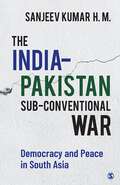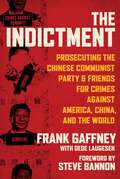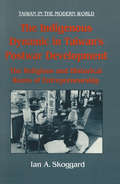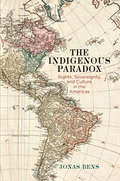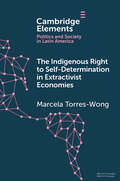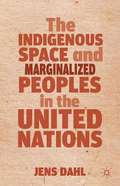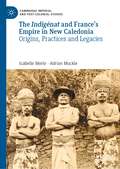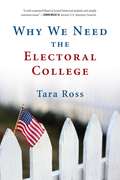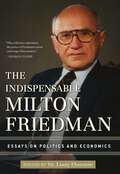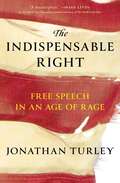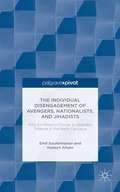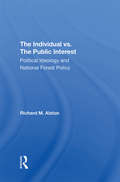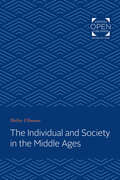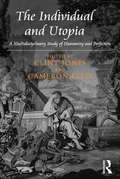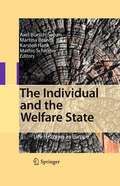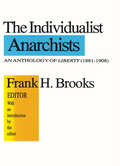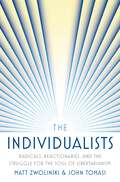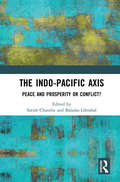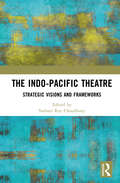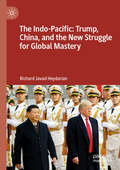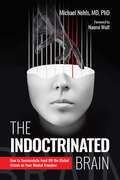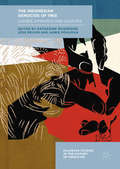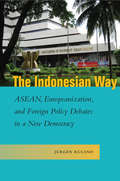- Table View
- List View
The India–Pakistan Sub-conventional War: Democracy and Peace in South Asia
by Sanjeev Kumar H. M.The India–Pakistan Sub-conventional War: Democracy and Peace in South Asia argues that it is possible to map the functioning of democracy in South Asia by studying the role of the army in the political processes of Pakistan. In December 1988, Pakistan experienced a transition to democracy. Simultaneously, the military–intelligence complex was also able to take advantage of insurgency in Jammu and Kashmir and intensify the proxy war against India. Considering such a contradictory political situation, this book studies the deepening conflictual trajectory of the India–Pakistan relations since 1989. By analyzing this period of history, it argues that, in South Asia, the process of democratic transition and intensification of the sub-conventional war have happened concurrently. The book further argues that overt nuclear weaponization and the failure of nuclear deterrence allowed the sustenance of the India–Pakistan sub-conventional war. By examining the subcontinental security predicament involving the two nuclear-powered adversaries, the book interrogates the democratic peace thesis. It deconstructs the thesis’ arguments in the geo-strategic context of the South Asian regional security architecture.
The Indictment: Prosecuting the Chinese Communist Party & Friends for Crimes against America, China, and the World
by Frank Gaffney Dede LaugesenA generation ago, Ronald Reagan mapped out and executed a strategy for taking down the last totalitarian communist regime that sought America&’s destruction: the Soviet Union&’s &“evil empire.&” We can settle for no less with respect to our time&’s &“existential threat to freedom.&” The Chinese Communist Party (CCP) can and must be thwarted in its determined bid to crush liberty, destroy our country, and institute what Xi Jinping calls &“global governance, directed and enforced from Beijing. This book represents the fruits of a comprehensive effort to develop and champion a Reaganesque strategy for our time. It draws upon a comprehensive program of some seventy webinars conducted by the Committee on the Present Danger: China addressing: 1) the CCP&’s decades-long self-described &“Unrestricted Warfare&” against America; and 2) the role America&’s elites have played in helping the Chinese Communists win. Drawing upon all this content, The Indictment identifies nine criminal &“charges&” that can and must be brought and prosecuted, at least in the court of public opinion, against the Chinese Communist Party and its American enablers. If, moreover, the CCP is designated as the Transnational Criminal Organization it is, actual criminal prosecutions of the Party and its friends should also be possible. The Indictment also enumerates twenty specific actions that are required to punish the perpetrators of war crimes against America and humanity—and defeat those likely in the offing. The Indictment is intended to inspire and equip congressional investigators, patriotic executive branch officials, journalists, and the public at large to review these charges and recommended actions for a surpassingly important and extremely urgent purpose: Bringing to justice and taking down the Chinese Communist Party for its horrific criminal conduct—past, present, and that which is in the works—against its own people and countless others, including ours.
The Indigenous Dynamic in Taiwan's Postwar Development: Religious and Historical Roots of Entrepreneurship
by Ian SkoggardUsing Taiwan's third largest export industry - shoe manufacturing - as a case study, this work contends that economic development can be tied to Taiwan's own cultural history as well as to the influx of foreign capital or the initiatives of the state government.
The Indigenous Paradox: Rights, Sovereignty, and Culture in the Americas (Pennsylvania Studies in Human Rights)
by Jonas BensAn investigation into how indigenous rights are conceived in legal language and doctrineIn the twenty-first century, it is politically and legally commonplace that indigenous communities go to court to assert their rights against the postcolonial nation-state in which they reside. But upon closer examination, this constellation is far from straightforward. Indigenous communities make their claims as independent entities, governed by their own laws. And yet, they bring a case before the court of another sovereign, subjecting themselves to its foreign rule of law.According to Jonas Bens, when native communities enter into legal relationships with postcolonial nation-states, they "become indigenous." Indigenous communities define themselves as separated from the settler nation-state and insist that their rights originate from within their own system of laws. At the same time, indigenous communities must argue that they are incorporated in the settler nation-state to be able to use its judiciary to enforce these rights. As such, they are simultaneously included into and excluded from the state.Tracing how the indigenous paradox is inscribed into the law by investigating several indigenous rights cases in the Americas, from the early nineteenth century to the early twenty-first, Bens illustrates how indigenous communities have managed—and continue to manage—to navigate this paradox by developing lines of legal reasoning that mobilize the concepts of sovereignty and culture. Bens argues that understanding indigeneity as a paradoxical formation sheds light on pressing questions concerning the role of legal pluralism and shared sovereignty in contemporary multicultural societies.
The Indigenous Right to Self-Determination in Extractivist Economies (Elements in Politics and Society in Latin America)
by Marcela Torres-WongInternational norms widely recognize the Indigenous right to self-determination by which Indigenous peoples define and purse their collective aspirations. Nevertheless, as progressive as legal frameworks might appear, in reality, few Indigenous communities enjoy this right and most remain vulnerable and disempowered. Activists blame Latin America's extractivist economies, while governments argue that extractive revenues are necessary to improve Indigenous life. Far from presenting a unified position, rural Indigenous peoples are most often divided over extractive industries. To assess how Indigenous self-determination has progressed, and the role that extractivism plays in this, this Element examines six Indigenous communities in Mexico, Bolivia, and Peru with contrasting experiences of extractive projects. It finds that the Indigenous ability to use favorable legislation in conjunction with available economic resources shapes different self-determination outcomes. Finally, it assesses Indigenous possibilities for self-determination in the light of environmental activism and discourses on Buen Vivir.
The Indigenous Space and Marginalized Peoples in the United Nations
by Jens DahlIn the UN, indigenous peoples have achieved more rights than any other group of people. This book traces this to the ability of indigenous peoples to create consensus among themselves; the establishment of an indigenous caucus; and the construction of a global indigenousness.
The Indigénat and France’s Empire in New Caledonia: Origins, Practices and Legacies (Cambridge Imperial and Post-Colonial Studies)
by Isabelle Merle Adrian MuckleThis book provides a long history of France’s infamous indigénat regime, from its origins in Algeria to its contested practices and legacies in France’s South Pacific territory of New Caledonia. The term indigénat is synonymous throughout the francophone world with the rigours and injustices of the colonial era under French rule. The indigénat regime or 'Native Code' governed the lives of peoples classified as French 'native' subjects in colonies as diverse as Algeria, West Africa, Madagascar, Indochina and New Caledonia. In New Caledonia it was introduced by decree in 1887 and remained in force until Kanak — New Caledonia’s indigenous people — obtained citizenship in 1946. Among the colonial tools and legal mechanisms associated with France’s colonial empire it is the one that has had the greatest impact on the memory of the colonized. Focussing on New Caledonia, the last remaining part of overseas France to have experienced the full force of the indigénat, this book illustrates the way that certain measures were translated into colonial practices, and sheds light on the tensions involved in the making of France as both a nation and a colonial empire. The first book to provide a comprehensive history of the indigénat regime, explaining how it first came into being and survived up until 1946 despite its constant denunciation, this is an important contribution to French Imperial History and Pacific History.
The Indispensable Electoral College: How the Founders' Plan Saves Our Country from Mob Rule
by Tara RossIt would certainly seem so. After all, the presidential candidate with the most popular votes has nevertheless lost the election at least three times, including 2016. To some Americans, that’s a scandal. They believe the Electoral College is an intolerable flaw in the Constitution, a relic of a bygone era that ought to have been purged long ago. But that would be a terrible mistake, warns Tara Ross in this vigorous defense of “the indispensable Electoral College.” <P><P>Far from an obstacle to enlightened democracy, the Electoral College is one of the guardrails ensuring the stability of the American Republic. In this lively and instructive primer, Tara Ross explains: Why the Founders established the Electoral College—and why they thought it vital to the Constitution Why the Electoral College was meant to be more important than the popular vote How the Electoral College prevents political crises after tight elections Why the Electoral College doesn’t favor one party over the other Why the states are the driving force behind presidential elections and how efforts to centralize the process have led to divisiveness and discontent Why the Electoral College is inappropriately labeled a “relic of slavery” Every four years, the controversy is renewed: Should we keep the Electoral College? Tara Ross shows you why the answer should be a resounding Yes! <P><P> The Indispensable Electoral College makes a winning argument for a necessary protection against "rigged" party elections, coastal elites, and DC insiders who wish to make a career of unchecked ambition.
The Indispensable Milton Friedman: Essays on Politics and Economics
by Lanny EbensteinMilton Friedman is one of the most famous economists in history. His writings and theories on everything from capitalism and freedom to deregulation and welfare have inspired movements, influenced government policies, and changed the course of America's economic history.Now, acclaimed Friedman biographer Dr. Lanny Ebenstein brings together twenty of Friedman's greatest essays in his new book, The Indispensable Milton Friedman: Essays on Politics and Economics. The only collection of Friedman's writings to span his entire career, The Indispensable Milton Friedman: Essays on Politics and Economics features some of Friedman's never-before-republished writings as well as the best and most timeless of his works.These exceptional essays not only illuminate the progression of Friedman's thought, but explain how America might overcome some of its most difficult challenges. Broken into two sections, politics and economics, The Indispensable Milton Friedman shows how we can ultimately turn America around, and is more necessary than ever during this critical election year and time of economic uncertainty.
The Indispensable Right: Free Speech in an Age of Rage
by Jonathan TurleyA &“timely and brilliant original&” (Michael B. Mukasey, former US attorney general) look at freedom of speech—our most basic right and the one that protects all the others.Free speech is a human right, and the free expression of thought is at the very essence of being human. The United States was founded on this premise, and the First Amendment remains the single greatest constitutional commitment to the right of free expression in history. Yet there is a systemic effort to bar opposing viewpoints on subjects ranging from racial discrimination to police abuse, from climate change to gender equity. These measures are reinforced by the public&’s anger and rage; flash mobs appear today with the slightest provocation. We all lash out against anyone or anything that stands against our preferred certainty. The Indispensable Right places the current attacks on free speech in their proper historical, legal, and political context. The Constitution and the Bill of Rights were not only written for times like these, but in a time like this. This country was born in an age of rage and for 250 years we have periodically lost sight of the value of free expression. The history of the struggle for free speech is the story of extraordinary people—nonconformists who refuse to yield to abusive authority—and here is a mosaic of vivid characters and controversies. Johnathan Turley &“has written a learned and bracing book, rigorously detailed and unfailingly evenhanded&” (The Wall Street Journal) showing us the unique dangers of our current moment. The alliance of academic, media, and corporate interests with the government&’s traditional wish to control speech has put us on an almost irresistible path toward censorship. The Indispensable Right is a &“magnum opus should be required reading for everyone who cares about free speech&” (Nadine Strossen, former president of the American Civil Liberties Union) that reminds us that we remain a nation grappling with the implications of free expression and with the limits of our tolerance for the speech of others. For rather than a political crisis, this is a crisis of faith.
The Individual Disengagement of Avengers, Nationalists, and Jihadists: Why Ex-Militants Choose to Abandon Violence in the North Caucasus
by Emil Souleimanov Huseyn AliyevThis studydetails the causes and contexts of individual disengagement of various types of militants - avengers, nationalists and jihadists - in Russia's North Caucasus region. It aims to considerably enhance our theoretical understanding of individual militants' incentives to abandon violence. "
The Individual Vs. The Public Interest: Political Ideology And National Forest Policy
by Richard M. AlstonCentral to the controversy surrounding U. S. natural resources policy is the conflict between environmentalists and proponents of development. Examining the evolution of the philosophies underlying that conflict, Dr. Alston traces the failure to achieve a unified resources policy to the seemingly incompatible ideological positions held by resource specialists, interest groups, policymakers, econo mists, and foresters. His analysis goes beyond his case study of na ional forest policy to focus on an ancient question basic to policy making in a democratic society: How can government provide a sociopolitical framework that accomodates both individual interests and the need for unity in a collective existence? Only within this broader framework, he argues, is it possible to determine the proper division between private and public resource management or the proper role of government in natural resources planning. Incorporating a critical evaluation of the development of classical and neoclassical economic theory, this work makes clear the need to strike a balance between a strictly individualistic and an ecological point of view. Dr. Alston illustrates the ideological conflicts that complicate resources planning and explores the possibility of a new ideology capable of accomodating and inte grating differences to meet the complex needs of society.
The Individual and Society in the Middle Ages
by Walter UllmannOriginally published in 1966. The Individual and Society in the Middle Ages, based on three guest lectures given at Johns Hopkins University in 1965, explores the place of the individual in medieval European society. Looking at legal sources and political ideology of the era, Ullmann concludes that, for most of the Middle Ages, the individual was defined as a subject rather than a citizen, but the modern concept of citizenship gradually supplanted the subject model from the late Middle Ages onward. Ullmann lays out the theological basis of the political theory that cast the medieval individual as an inferior, abstract subject. The individual citizen who emerged during the late Middle Ages and the Renaissance, by contrast, was an autonomous participant in affairs of state. Several intellectual trends made this humanistic conception of the individual possible, among them the rehabilitation of vernacular writing during the thirteenth century and the growing interest in nature, natural philosophy, and natural law. However, Ullmann points to feudalism as the single most important medieval institution that laid the groundwork for the emergence of the modern citizen.
The Individual and Utopia: A Multidisciplinary Study of Humanity and Perfection
by Clint Jones Cameron EllisCentral to the idea of a perfect society is the idea that communities must be strong and bound together with shared ideologies. However, while this may be true, rarely are the individuals that comprise a community given primacy of place as central to a strong communal theory. This volume moves away from the dominant, current macro-level theorising on the subject of identity and its relationship to and with globalising trends, focusing instead on the individual’s relationship with utopia so as to offer new interpretive approaches for engaging with and examining utopian individuality. Interdisciplinary in scope and bringing together work from around the world, The Individual and Utopia enquires after the nature of the utopian as citizen, demonstrating the inherent value of making the individual central to utopian theorizing and highlighting the methodologies necessary for examining the utopian individual. The various approaches employed reveal what it is to be an individual yoked by the idea of citizenship and challenge the ways that we have traditionally been taught to think of the individual as citizen. As such, it will appeal to scholars with interests in social theory, philosophy, literature, cultural studies, architecture, and feminist thought, whose work intersects with political thought, utopian theorizing, or the study of humanity or human nature.
The Individual and the Welfare State
by Mathis Schröder Martina Brandt Karsten Hank Axel Börsch-SupanOur health, our income and our social networks at older ages are the consequence of what has happened to us over the course of our lives. The situation at age 50+ reflects our own decisions as well as many environmental factors, especially interventions by the welfare state. This book explores the richness of 28,000 life histories in thirteen European countries, collected as part of the Survey of Health, Ageing and Retirement in Europe (SHARE). Combining these data with a comprehensive account of European welfare state interventions provides a unique opportunity to answer the important public policy questions of our time - how the welfare state affects people's incomes, housing, families, retirement, volunteering and health. The overarching theme of the welfare state creates a book of genuinely interdisciplinary analyses, a valuable resource for economists, gerontologists, historians, political scientists, public health analysts, and sociologists alike.
The Individualist Anarchists: Anthology of Liberty, 1881-1908
by Frank H. BrooksAmong the political ideologies generally considered to be of continuing significance, anarchism alone has never been implemented. Perhaps its rigors are too strong and its advocates are too weak. That it is still considered worth studying is testimony to its intellectual credibility, particularly its single-minded emphasis on individual liberty. Obsession with liberty and skepticism of government are as alive today as they were in the nineteenth century. This book offers a comprehensive introduction to anarchism in the United States, revealing its historical roots and relevance to today's problems. The relationship between anarchy and individualism in the nineteenth century is well known. How this affected the larger system is what the bulk of the anthology is about.Liberty was a magazine featuring some of the outstanding anarchist thinkers in America at the turn of the century. This anthology offers a selection of writings spanning the magazine's twenty-seven year life and features some of its major writers: Benjamin Tucker, Victor Yarros, Steven Byington, John Beverley Robinson, and Gertrude Kelly. The chapters are divided into four sections: political theory, economic theories and reforms, social implications, and strategies of individualist anarchism. The authors criticize censorship, state support of patriarchal marriage, and the general invasion of privacy. Though quite radical, the writers were not revolutionaries in a conventional sense; they emphasized passive resistance, rather than violent assault, as proper.The Individualist Anarchists is not merely of historical Interest, but offers a fundamental critique of government and authority - one that remains a relevant part of today's libertarian movement. It will be of Interest to political theorists, economists, sociologists, and scholars of American history; above all, to those who may not yet have appreciated the worth of an analysis made so many years ago.
The Individualists: Radicals, Reactionaries, and the Struggle for the Soul of Libertarianism
by John Tomasi Matt ZwolinskiA sweeping history of libertarian thought, from radical anarchists to conservative defenders of the status quoLibertarianism emerged in the mid-nineteenth century with an unwavering commitment to progressive causes, from women’s rights and the fight against slavery to anti-colonialism and Irish emancipation. Today, this movement founded on the principle of individual liberty finds itself divided by both progressive and reactionary elements vying to claim it as their own. The Individualists is the untold story of a political doctrine continually reshaped by fierce internal tensions, bold and eccentric personalities, and shifting political circumstances.Matt Zwolinski and John Tomasi trace the history of libertarianism from its origins as a radical progressive ideology in the 1850s to its crisis of identity today. They examine the doctrine’s evolution through six defining themes: private property, skepticism of authority, free markets, individualism, spontaneous order, and individual liberty. They show how the movement took a turn toward conservativism during the Cold War, when the dangers of communism at home and abroad came to dominate libertarian thinking. Zwolinski and Tomasi reveal a history that is wider, more diverse, and more contentious than many of us realize.A groundbreaking work of scholarship, The Individualists uncovers the neglected roots of a movement that has championed the poor and marginalized since its founding, but whose talk of equal liberty has often been bent to serve the interests of the rich and powerful.
The Indo-Pacific Axis: Peace and Prosperity or Conflict?
by Satish Chandra Baladas GhoshalThe term ‘Indo-Pacific’ is being used increasingly in the global strategic/geo-political discourse in recent years. The rise of China as an economic giant and a rising military power has led to the consequent shift of international politics and relations to Asia as the fulcrum. It has turned the whole region of Indo-Pacific as one security complex. Countries that are part of the region but also countries that are adjacent or outside the region, but also the countries adjoining the oceans look for a mechanism in accordance with a rule-based order. International law that would protect the rights of the nations to pursue global commons was emphasized.This timely volume presents a collection of articles by leading scholars on the subject from the region. It addresses the faultlines of both traditional and non-traditional security issues. Military modernization, especially of the naval forces of a number of powers, national ambitions of power projection, and plans to build ports in strategic locations are exacerbating insecurity and greater arms race.It also poses the question, whether the Indo-Pacific region will become a theatre of tension and instability, or a contributor to peace and prosperity for the larger populations that reside herein? Please note: Taylor & Francis does not sell or distribute the Hardback in India, Pakistan, Nepal, Bhutan, Bangladesh and Sri Lanka.
The Indo-Pacific Theatre: Strategic Visions and Frameworks
by Srabani Roy ChoudhuryThis book studies the internal framework of the Indo-Pacific region and examines the strategic issues faced by the countries that belong to it. Over the years, the Indo-Pacific region has become a prime driver of global economic growth and has generated considerable interest from countries both within and without. The region is now witnessing an intensified great power competition for greater geostrategic space, thus shaping the 21st-century world order. The volume focuses on the emerging strategies of the main actors involved in this competition. It discusses various key issues such as the purpose of the Quadrilateral Security Dialogue and its post-pandemic agenda, the conceptualisation of a Free and Open Indo-Pacific (FOIP) amid an intensifying Sino-US great power competition, the strategies of ASEAN and South Korea, China’s activities in the Indo-Pacific, economic architecture and supply chain disruption in the region, as well as the geopolitical strategy of the European Union for the Indo-Pacific. A crucial study of the Indo-Pacific region in the post-COVID-19 world, the book gives fresh insights into the areas of convergence and divergence in the strategic visions of the many regional actors. It will be of great interest to policymakers as well as students and academics in the fields of political science, international relations, foreign policy, geopolitics, security studies, strategic studies, as well as area studies, namely East and Southeast Asian studies, European Union studies, American studies and Australian studies.
The Indo-Pacific: Trump, China, and the New Struggle for Global Mastery
by Richard Javad HeydarianThis book places the presidency of Donald Trump as well as the brewing Sino-American Cold War within the broader historical context of American hegemony in Asia, which traces its roots to Alfred Thayer Mahan’s call for a naval build up in the Pacific, the subsequent colonization of the Philippines and, ultimately, reaching its apotheosis after the defeat of Imperial Japan in the Second World War. The book, drawing on visits from Cairo to California and Perth to Pyongyang as well as interviews and exchanges with heads of state and senior officials from across the Indo-Pacific, provides an overview of the arc of American primacy in the region for scholars, journalists, and concerned citizens.
The Indoctrinated Brain: How to Successfully Fend Off the Global Attack on Your Mental Freedom
by Michael NehlsGlobal War on the Human Brain Throughout the world, mental capacity is declining, especially among young people, while depression rates are rising dramatically. Meanwhile, one in forty men and women suffers from Alzheimer's, and the age of onset is falling rapidly. But the causes are not being eliminated, quite the opposite. Can this just be coincidence? The Indoctrinated Brain introduces a largely unknown, powerful neurobiological mechanism whose externally induced dysfunction underlies these catastrophic developments. Michael Nehls, medical doctor and internationally renowned molecular geneticist, lays out a shattering chain of circumstantial evidence indicating that behind these numerous negative influences lies a targeted, masterfully executed attack on our individuality. He points out how the raging wars against viruses, about climate change, or over national borders are—more likely intended than not—fundamentally providing the platform for such an offensive against the human brain that is steadily changing our being and is aimed at depriving us of our ability to think for ourselves. But it is not too late. By exposing these brain-damaging processes and describing countermeasures that anyone can take, Nehls brings light and hope to this fateful chapter in human history. Nothing less will be decided than the question of whether our species can retain its humanity and its creative power or whether it will lose them irretrievably.
The Indoctrination of the Wehrmacht: Nazi Ideology and the War Crimes of the German Military
by Bryce SaitFar from the image of an apolitical, “clean” Wehrmacht that persists in popular memory, German soldiers regularly cooperated with organizations like the SS in the abuse and murder of countless individuals during the Second World War. This in-depth study demonstrates that a key factor in the criminalization of the Wehrmacht was the intense political indoctrination imposed on its members. At the instigation of senior leadership, many ordinary German soldiers and officers became ideological warriors who viewed their enemies in racial and political terms—a project that was but one piece of the broader effort to socialize young men during the Nazi era.
The Indomitable Florence Finch: The Untold Story of a War Widow Turned Resistance Fighter and Savior of American POWs
by Robert J. Mrazek"An American hero-long forgotten-finally gets her due in this riveting narrative. You will absolutely love Florence Finch: her grit, her compassion, her fight. This isn't just history; she is a woman for our times." -Keith O'Brien, the New York Times bestselling author of Fly Girls The riveting story of an unsung World War II hero who saved countless American lives in the Philippines, told by an award-winning military historian.When Florence Finch died at the age of 101, few of her Ithaca, NY neighbors knew that this unassuming Filipina native was a Presidential Medal of Freedom recipient, whose courage and sacrifice were unsurpassed in the Pacific War against Japan. Long accustomed to keeping her secrets close in service of the Allies, she waited fifty years to reveal the story of those dramatic and harrowing days to her own children.Florence was an unlikely warrior. She relied on her own intelligence and fortitude to survive on her own from the age of seven, facing bigotry as a mixed-race mestiza with the dual heritage of her American serviceman father and Filipina mother.As the war drew ever closer to the Philippines, Florence fell in love with a dashing American naval intelligence agent, Charles "Bing" Smith. In the wake of Bing's sudden death in battle, Florence transformed from a mild-mannered young wife into a fervent resistance fighter. She conceived a bold plan to divert tons of precious fuel from the Japanese army, which was then sold on the black market to provide desperately needed medicine and food for hundreds of American POWs. In constant peril of arrest and execution, Florence fought to save others, even as the Japanese police closed in. With a wealth of original sources including taped interviews, personal journals, and unpublished memoirs, The Indomitable Florence Finch unfolds against the Bataan Death March, the fall of Corregidor, and the daily struggle to survive a brutal occupying force. Award-winning military historian and former Congressman Robert J. Mrazek brings to light this long-hidden American patriot. The Indomitable Florence Finch is the story of the transcendent bravery of a woman who belongs in America's pantheon of war heroes.
The Indonesian Genocide of 1965: Causes, Dynamics And Legacies (Palgrave Studies in the History of Genocide)
by Katharine McGregor Jess Melvin Annie PohlmanThis collection of essays by Indonesian and foreign contributors offers new and highly original analyses of the mass violence in Indonesia which began in 1965 and its aftermath. Fifty years on from one the largest genocides of the twentieth century, they probe the causes, dynamics and legacies of this violence through the use of a wide range of sources and different scholarly lenses. Chapter 12 of this book is available open access under a CC BY 4.0 license at link.springer.com.
The Indonesian Way: ASEAN, Europeanization, and Foreign Policy Debates in a New Democracy
by Jürgen RülandOn December 31, 2015, the ten-member Association of Southeast Asian Nations (ASEAN) ushered in a new era with the founding of the ASEAN Community (AC). The culmination of 12 years of intensive preparation, the AC was both a historic initiative and an unprecedented step toward the area's regional integration. Political commentators and media outlets, however, greeted its establishment with little fanfare. Implicitly and explicitly, they suggested that the AC was only the beginning: Southeast Asia, they seemed to say, was taking its first steps on a linear process of unification that would converge on the model of the European Union. In The Indonesian Way, Jürgen Rüland challenges this previously unquestioned diffusion of European norms. Focusing on the reception of ASEAN in Indonesia, Rüland traces how foreign policy stakeholders in government, civil society, the legislature, academe, the press, and the business sector have responded to calls for ASEAN's Europeanization, ultimately fusing them with their own distinctly Indonesian form of regionalism. His analysis reframes the nature of ASEAN as well as the discipline of international relations more broadly, writing a narrative of regional integration and norm diffusion that breaks free of Eurocentric thought.
